Last year, we reviewed one of Samsung’s latest 980 PRO M.2 NVMe Gen4 SSD. It was only a 500GB capacity, so the performance was not that stellar. Today, we check out the 980 PRO 2TB capacity, offering slightly faster read and write speeds. In fact, I was waiting for this 2TB version so that I can compare it with WD’s latest Gen4 SSD with the same capacity. Which one do you think will be the fastest Gen4 SSD? Will it be the Samsung 980 PRO or the WD Black SN850? Find out in our Samsung 980 Pro 2TB review/comparison below.
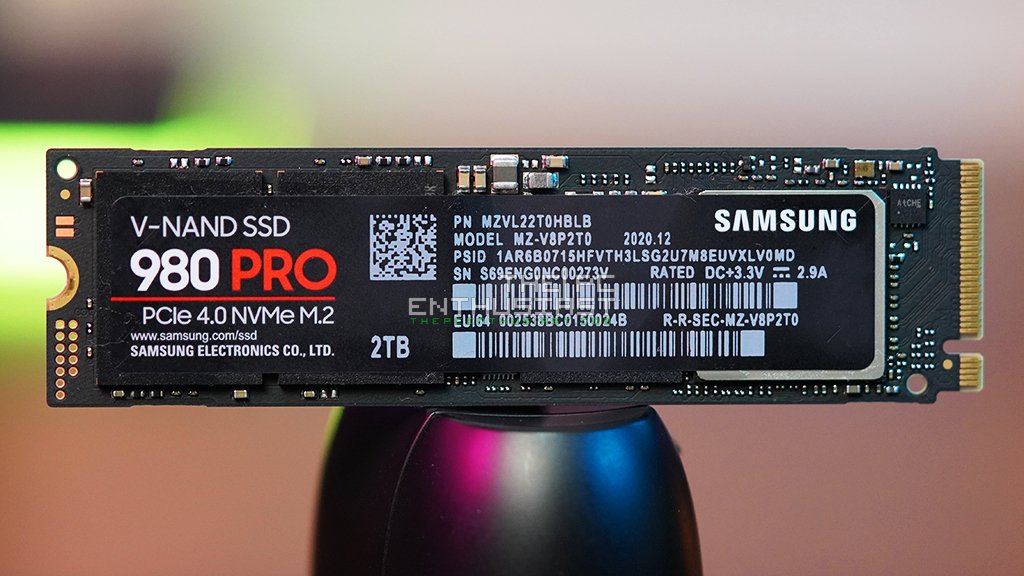
Samsung 980 PRO 2TB M.2 NVMe Gen4 SSD Review
Before we start comparing both drives, allow me to discuss a little bit about the Samsung 980 PRO 2TB capacity first. The Samsung 980 Pro SSD series features a new Elpis controller that can process 128 I/O queues simultaneously. It is about four times that of the previous Phoenix controller used in the 970 Pro and EVO Plus.
The new Samsung Elpis controller was manufactured using an “extremely fine” 8nm process. This is to “satisfy modern needs for high performance without compromising power efficiency”. With the new Elpis controller, the Samsung 980 Pro can reach up to 7,000MB/s sequential speed.
According to Samsung:
“However, in fact, the performance of PCIe 4.0 SSDs released in 2019 were never better than 5,000 MB/s for reads, 4,400 MB/s for writes. This is only 42% better than the previous PCIe 3.0 SSD’s 3,500 MB/s performance even though the bandwidth doubled. Samsung’s answer to this is the 980 PRO, which features up to 7,000 MB/s for reads and up to 5,000 MB/s for writes.”
The Elpis controller is paired with Samsung’s 6th Gen V-NAND flash chips. The new V-NAND adds around 40% more cells to the previous 9x-layer single-stack structure. Combining both, the Samsung 980 Pro SSD can deliver up to 7,000MB/s sequential read speed and up to 5,100MB/s sequential write speed. Or up to 1,000K IOPS of random read and write (4KB, QD32 Thread16).
The 980 PRO is a Gen4 SSD, but it is backward compatible with PCIe 3.0 or Gen3 interface. However, expect that speeds will be reduced. Sequential performances are only up to 3500MB/s for reads, and up to 3470MB/s for writes. And Random speeds will only be up to 680K IOPS (2TB) for reads, and 630K IOPS for writes.
Aside from the fast read and write speeds, the Samsung 980 Pro also features an enhanced Intelligent TurboWrite 2.0 technology. Compared to the previous Intelligent TurboWrite, Intelligent TurboWrite 2.0 provides up to 5 times larger buffer (TurboWrite region).
Below are a table and diagram comparing the Intelligent TurboWrite (2.0) of the 980 Pro and the 970 EVO Plus. Unfortunately, the diagram only shows up to 1TB capacity. But I assume the 2TB capacity has the same configuration as the 1TB capacity.
One thing to remember about Samsung’s Intelligent TurboWrite feature is that it takes advantage of the drive’s idle capacity. If the SSD does not have more than 324GB of free space for the 1TB model; intelligent TurboWrite will not fully operate. This algorithm does not affect SSD endurance, because the total amount of data users write on the SSD is unchanged.
Samsung 980 Pro 2TB SSD Specifications
Packaging and Closer Look


Samsung has been using a new rectangular packaging with their latest products. If I am not mistaken, I first saw this type of box art and design last year; starting with the 870 QVO SSD.


Samsung hasn’t changed how their M.2 SSDs look. It still sports an all-black design, with a black label and text in white color. The red accent usually denotes Samsung’s PRO series. While the orange is tied to the EVO series and the (light) yellow represents the QVO series.
I did not remove the sticker label, as not to ruin the SSD; but the big silver chip on the right-hand-side is the Elpis controller. Meanwhile, there are only two NAND flash chips, 1TB each, for a total of 2TB capacity. The other side, or underside, is not populated with any chips. Instead, they slapped a copper sheet to serve as a heatsink.

Samsung has implemented three technologies to help with the drive’s temperature. The 980 Pro has a heat spreader (see above); a nickel coating on the Elpis controller; and a fine-tuned controller with advanced Dynamic Thermal Guard (DTG) technology. This is supposed to help the 980 Pro from overheating. But I’d still recommend that you put it under a heatsink; especially if your motherboard has a heatsink cover for the M.2 drives.
The Test Setup
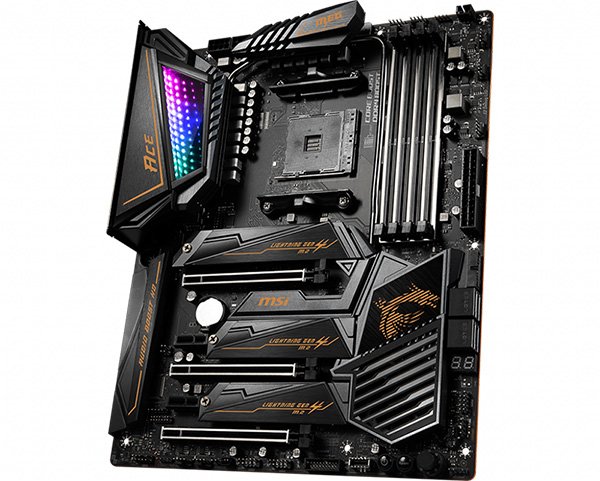
The Samsung 980 Pro SSD is a PCIe 4.0 Gen4 SSD; meaning the older generation or system may not support this drive. The only system that currently supports this type of SSD is an AMD X570 or B550 motherboard; powered by (at least) an AMD Ryzen 3000 CPU. Of course, the latest Ryzen Threadripper supports them as well.
Intel’s upcoming Z590 motherboards and some Z490 motherboards paired with the latest 11th Gen Intel Core CPUs will also support Gen4 SSDs. Again, you can install this on a PCIe 3.0 M.2 slot, but the speed will be limited to around 30Gbps. Below are the specifications of the system I used to test the 980 PRO 2TB capacity.
| Operating System | Windows 10 Pro 64bit version 2004 |
| Motherboard | MSI MEG X570 ACE |
| Processor | AMD Ryzen 7 3700X |
| CPU Cooler | Wraith Prism Cooler |
| Memory | Crucial Ballistix Elite 32GB DDR-4000 |
| Graphics Card | Zotac GeForce RTX 3060 Ti Twin Edge OC Review |
| OS Drive | ADATA Spectrix S40G M.2 NVMe SSD |
| Power Supply | Seasonic Prime 850W Titanium |
Samsung 980 Pro 2TB Benchmark Results
AJA Benchmark Results
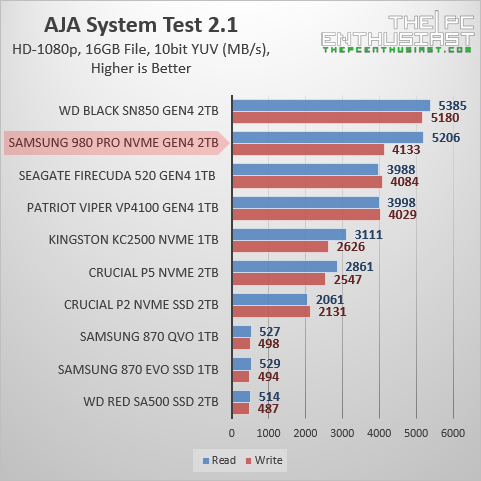
In the AJA System test, we can see that the Samsung 980 Pro 2TB is almost neck and neck with the WD Black SN850 2TB in sequential read. However, it falls behind when it comes to sequential write speed; by around 1,000 MB/s. Both drives are faster than the 1st gen Gen4 SSDs.
AS SSD Benchmark Results
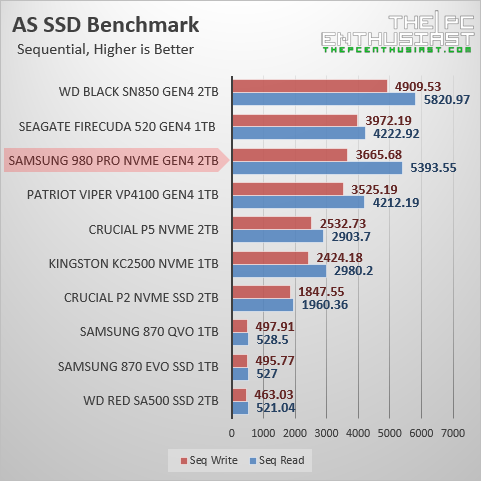

Moving to AS SSD benchmark results, the Samsung 980 Pro 2TB falls behind further in the sequential write test. The Seagate FireCuda 520 1TB outperformed it by a few MB/s in write. While the WD Black SN850 remains on top, both in read and write sequential speeds.
When it comes to 4K random tests, both the WD SN850 and 980 Pro went down. Although the SN850 came on top or is a bit faster by a few MB/s; I would consider that both of them have the same performance when it comes to 4K random workloads. These numbers do change every time you run the benchmark, so a few MB/s difference won’t be noticeable in real-world scenario.
ATTO Disk Benchmark Results

In the ATTO Disk benchmark, we see a similar result to the AJA system test. Both benchmark tests are based o sequential speeds. But ATTO Disk benchmark shows the maximum theoretical speed of a storage drive.
We can see that the Samsung 980 Pro 2TB capacity is behind its advertised speed of 7,000MB/s sequential read and 5,100MB/s sequential write. It is quite uncommon for a Samsung drive to miss or falls short of its advertised speed by a substantial margin. At least based on the Samsung drives I have tested before. Perhaps I should re-do the benchmarks using a Z590 motherboard powered with one of Intel’s newer 11th gen CPUs soon.
CrystalDiskMark Benchmark Results

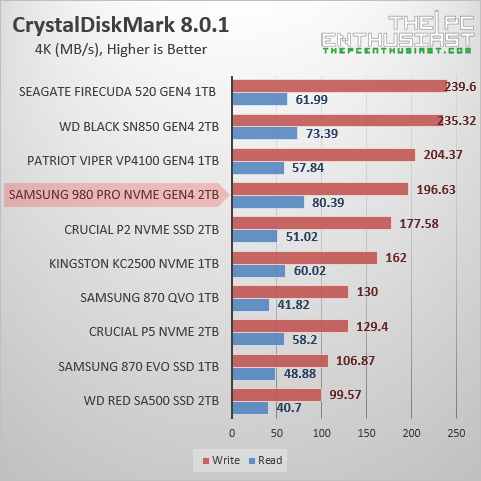
The results that I got in CrystalDiskMark are much closer to the 980 Pro 2TB’s advertised speed. Nevertheless, it still falls behind the WD Black SN850 2TB by a few MB/s. We can also see much better 4K random results using this test. Both the SN850 and 980 Pro are trading blows with the other Gen4 SSDs in this test.
ezIOmeter Benchmark Results
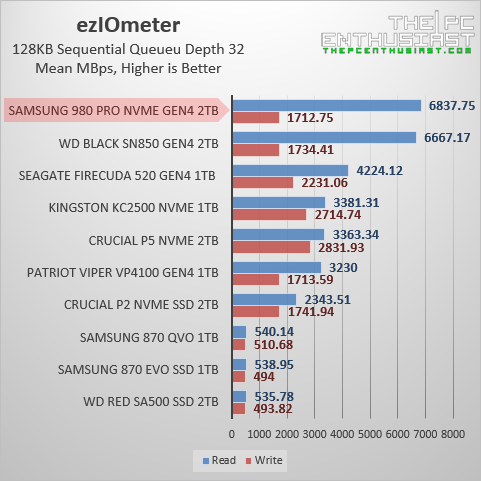
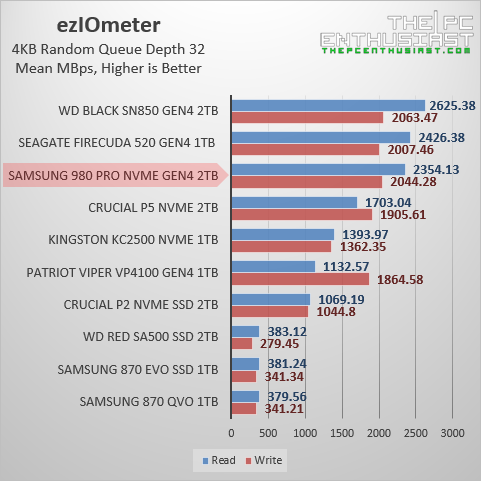
In this test, the Samsung 980 Pro 2TB outperformed the SN850 in the sequential test. However, both newer Gen4 drives performed poorly during the sequential write workloads. Although, it wasn’t the case when it comes to the 4KB random workloads. Both the 980 Pro and SN850 performed well; with a read and write speeds of above 2,000MB/s.
PCMark 8 Storage Benchmark Results
The PCMark 8 Storage test is more intensive and uses a real-world scenario to test the drive. It tests the performance of SSDs, HDDs, and hybrid drives with traces recorded from Adobe Creative Suite, Microsoft Office, and a selection of popular games. It also highlights real-world performance differences between storage devices, unlike synthetic storage tests.
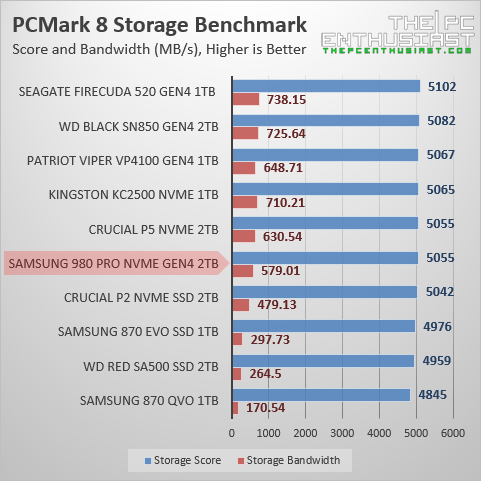
Looking at the results above, this tells us that there’s not a huge difference between all of the Gen4 SSDs. Their storage scores are very close; although the 980 Pro 2TB seems to fall behind when it comes to its storage bandwidth. I ran the benchmark a couple of times, but the results were very similar.
PCMark 10 Full System Drive Benchmark Results
Last but not the least, I tested the Samsung 980 Pro 2TB SSD using PCMark 10’s full system drive. This test uses a wide-ranging set of real-world traces from popular applications and common tasks to fully test the performance of the fastest modern drives. This will give us a more realistic expectation of a drive’s performance and a closer to a real-world testing scenario.
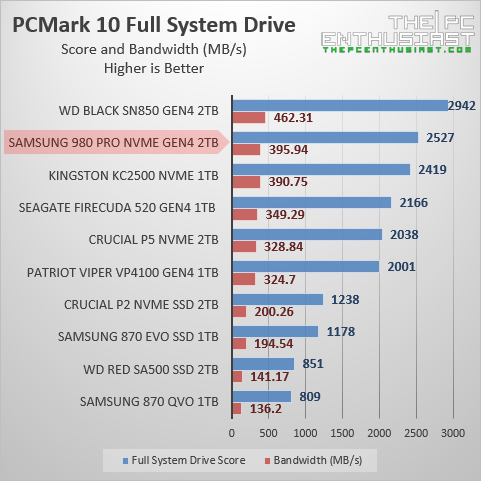
This is the result that I am expecting to see. I think this is more reliable than PCMark 8’s storage test. Unfortunately for the 980 Pro, the WD Black SN850 2TB still came on top. It’s faster by a few points and a few MB/s, but I don’t think that you would notice their performance difference in real-world use and scenario.
Pricing and Availability
The 2TB capacity Samsung 980 PRO Gen4 SSD is now available; along with the 1TB, 500GB, and 250GB models. The MSRP for the 2TB capacity is $429.99; followed by $229.99 for the 1TB, $149.99 for the 500GB and $89.99 for the 250GB capacity. Samsung is also offering a 5-year limited warranty for the said drive.
Prices of SSD tend to change frequently. So, for the latest pricing and availability, kindly check out the links below.
Samsung 980 Pro latest pricing and availability:
For US: available at Amazon.com here
Global/US: available at Newegg.com here
Samsung 980 Pro 2TB NVMe Gen4 SSD Review Conclusion
So, is the Samsung 980 Pro 2TB faster than the WD Black SN850 2TB? As you have seen from the benchmark results above, the WD Black SN850 2TB is the faster Gen4 SSD. But not by a significant margin. Does this mean that the SN850 is the better drive overall? Well, sort of.
Both the 980 Pro and SN850 are excellent Gen4 SSDs. You can’t go wrong with any of these drives. However, with a Samsung SSD, you can take advantage of the company’s proprietary software; like the Magician and Data Migration. Samsung’s Magician software is simply well polished and ahead of its competition. WD also has an SSD tool kit, called the WD Dashboard. But WD doesn’t have proprietary migration software.
Samsung also has an advantage when it comes to brand and reputation. For years, Samsung’s SSDs have been leading in the market. And it’s usually the choice of enthusiasts, gamers, and system builders. However, this time, WD was able to outperform Samsung’s top-of-the-line SSD. Although, not by a huge margin.
One thing I would like to note here is that the results would vary depending on the system used. You may get a better or higher score than in our tests. But I don’t think that the difference would be significant enough to outperform WD’s SN850. I am planning to test these drives, again, when I get my hands on a new Z590 motherboard and 11th gen CPU. Let’s see if the results would be any better (or not) on an Intel system.
TL;DR Samsung 980 Pro 2TB vs WD Black SN850 2TB which one to get?
To be honest, either drive will be fine. Both drives are currently some of the fastest, if not the fastest in the market. They both have a similar life expectancy and warranty period. It boils down to personal preference and which one is cheaper at the time. If you are looking for an M.2 SSD for gaming, these Gen4 SSDs are quite over the top; at least for the current game titles. Any Gen3 or even a SATA SSD would do; as long as the SSD has a good random performance.




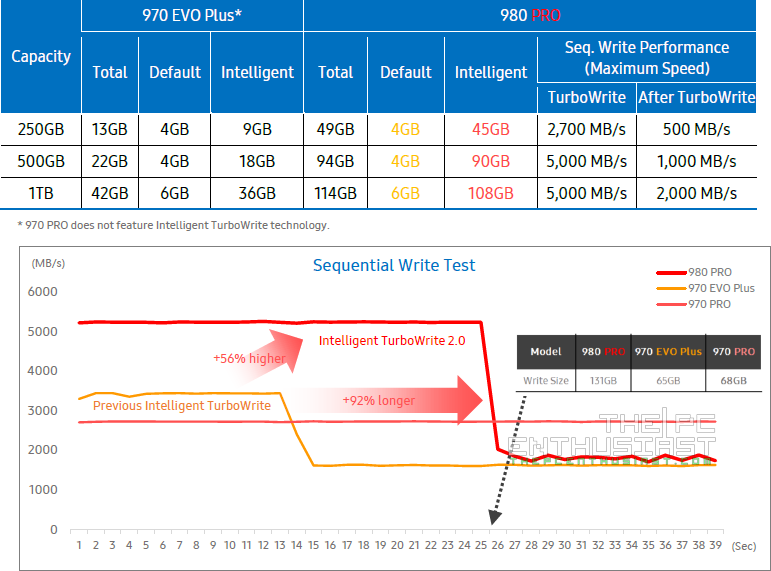
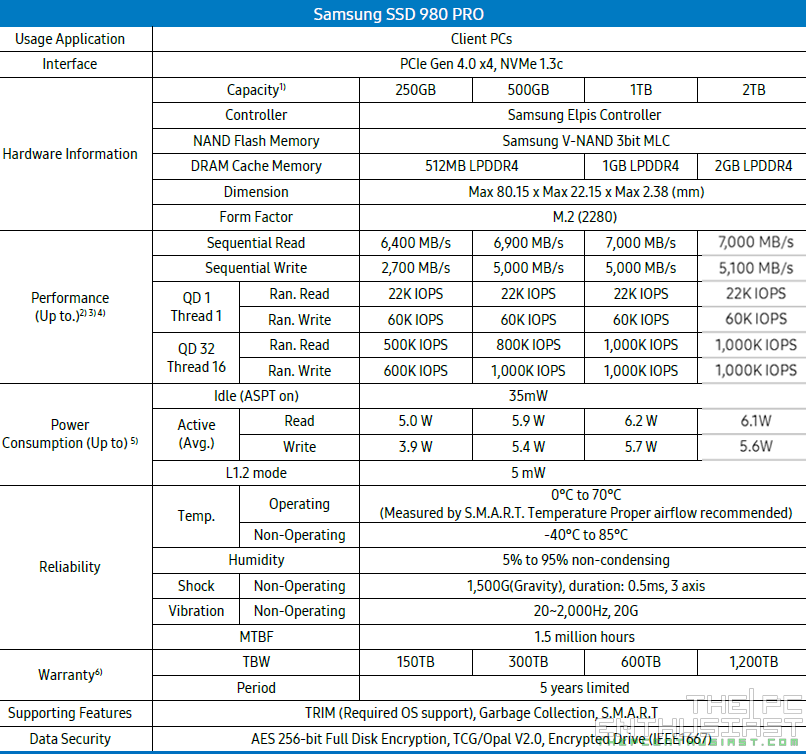
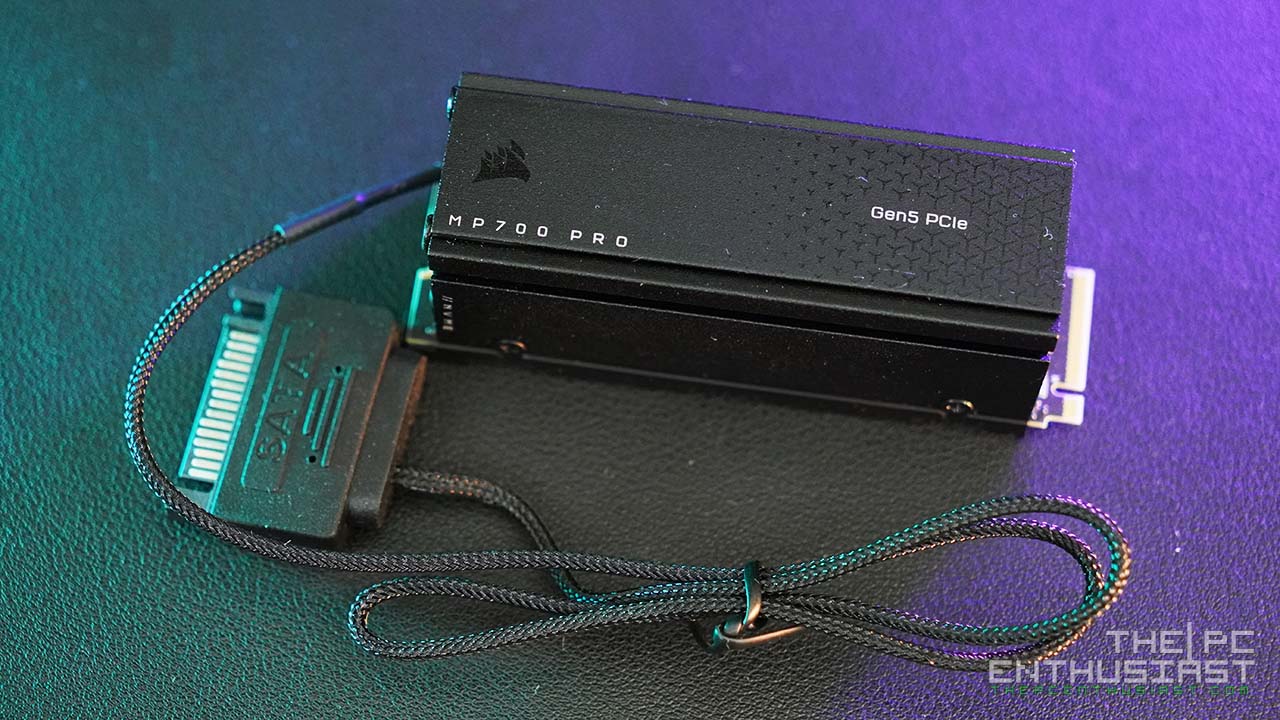
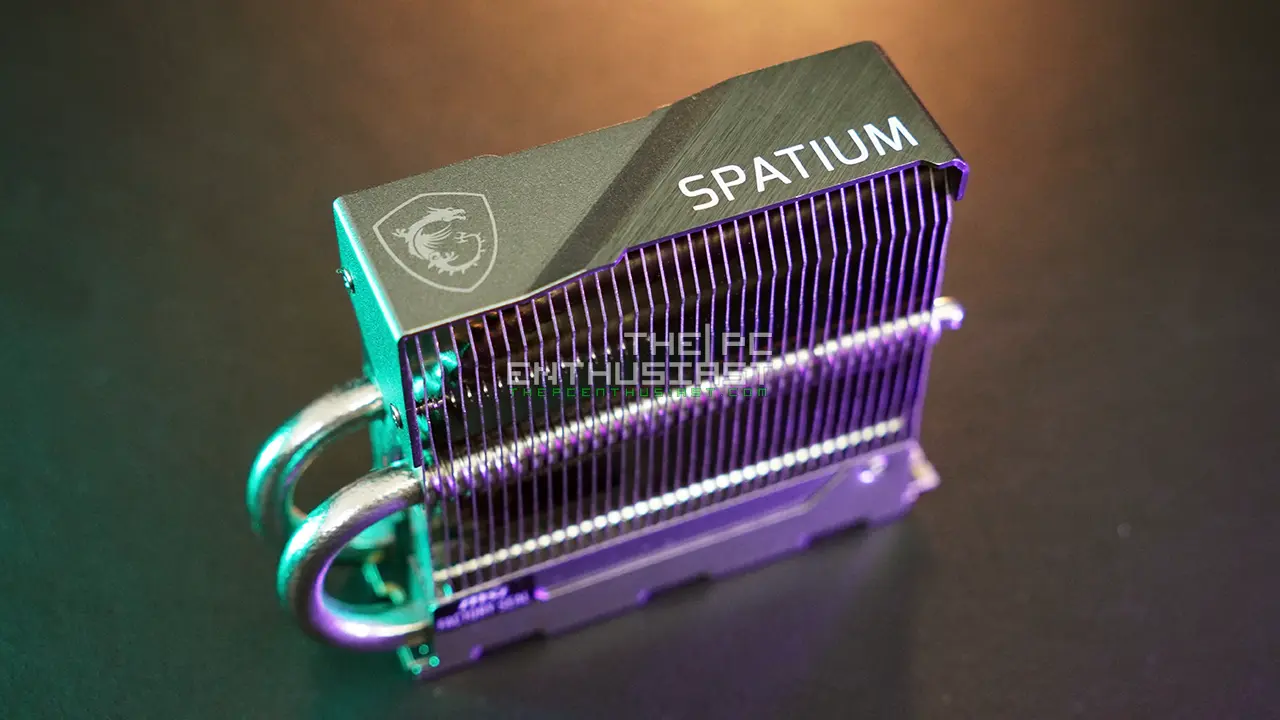
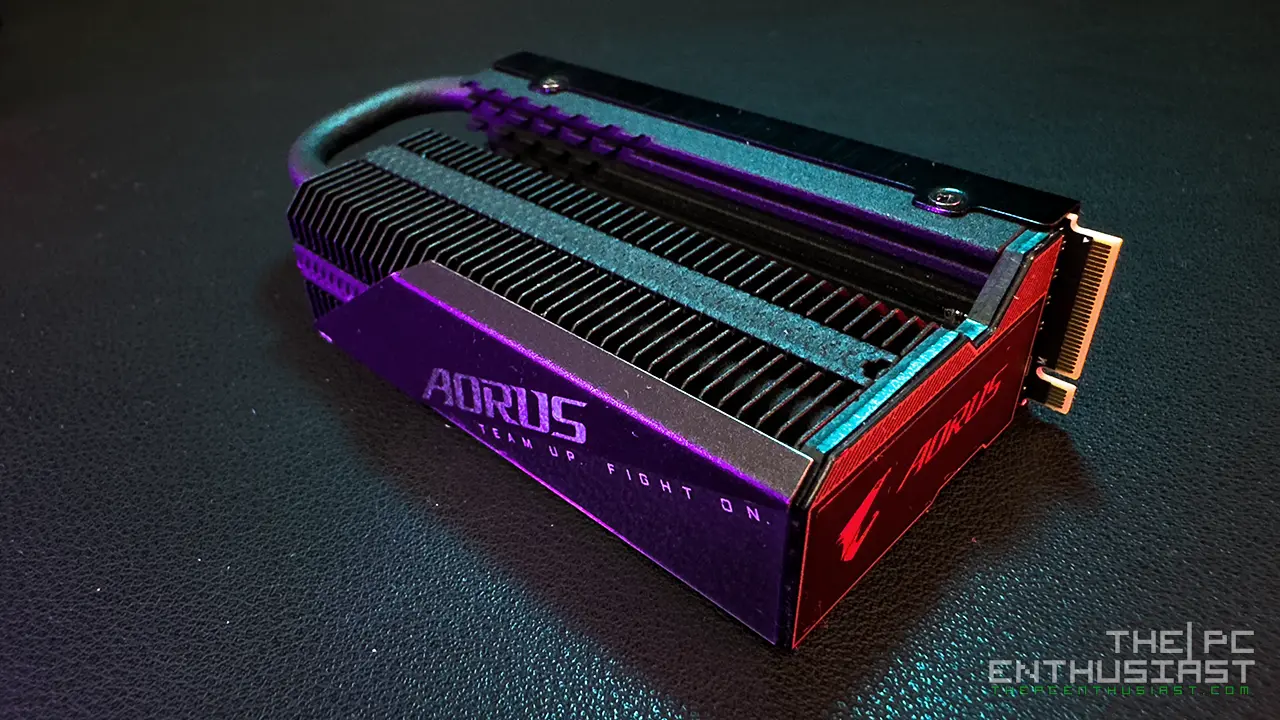
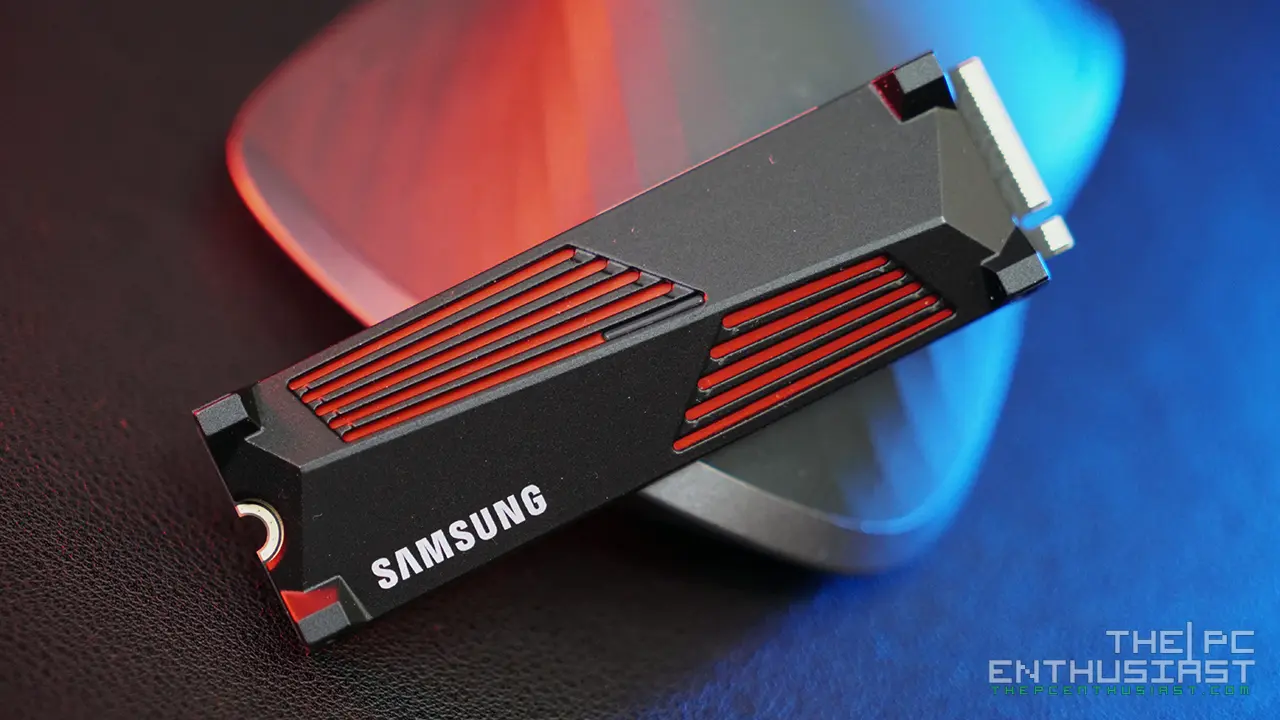
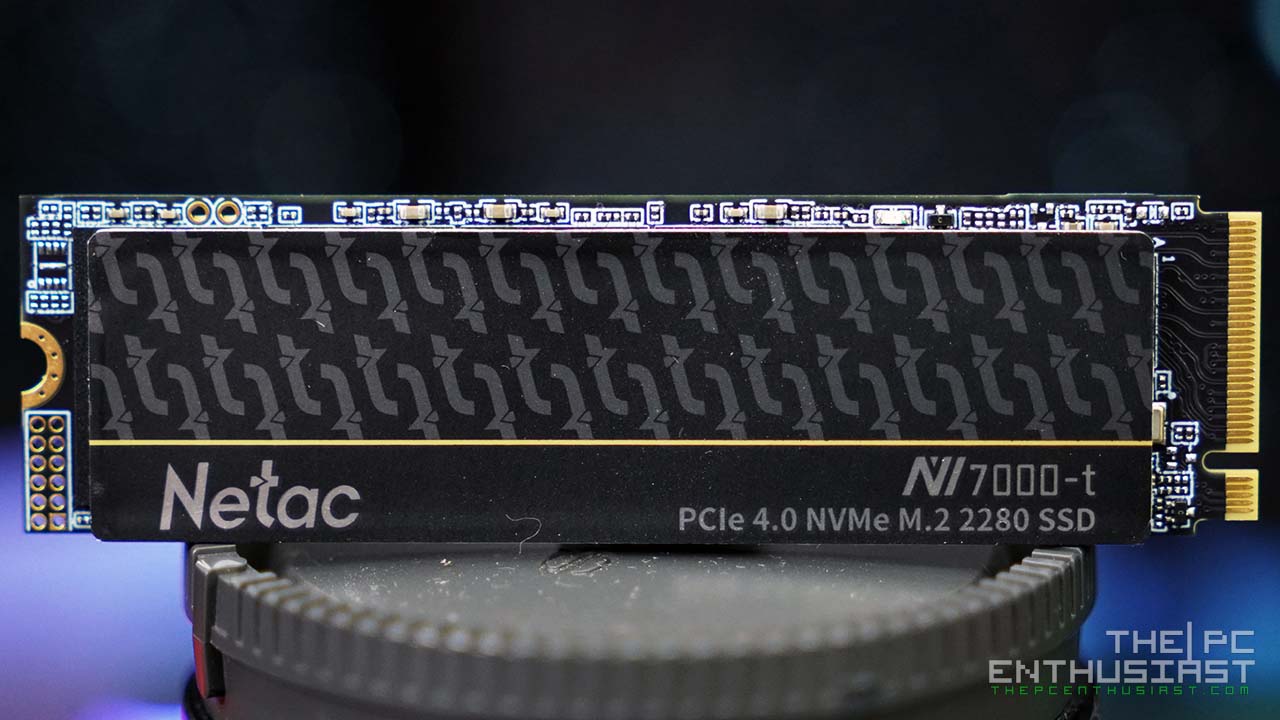
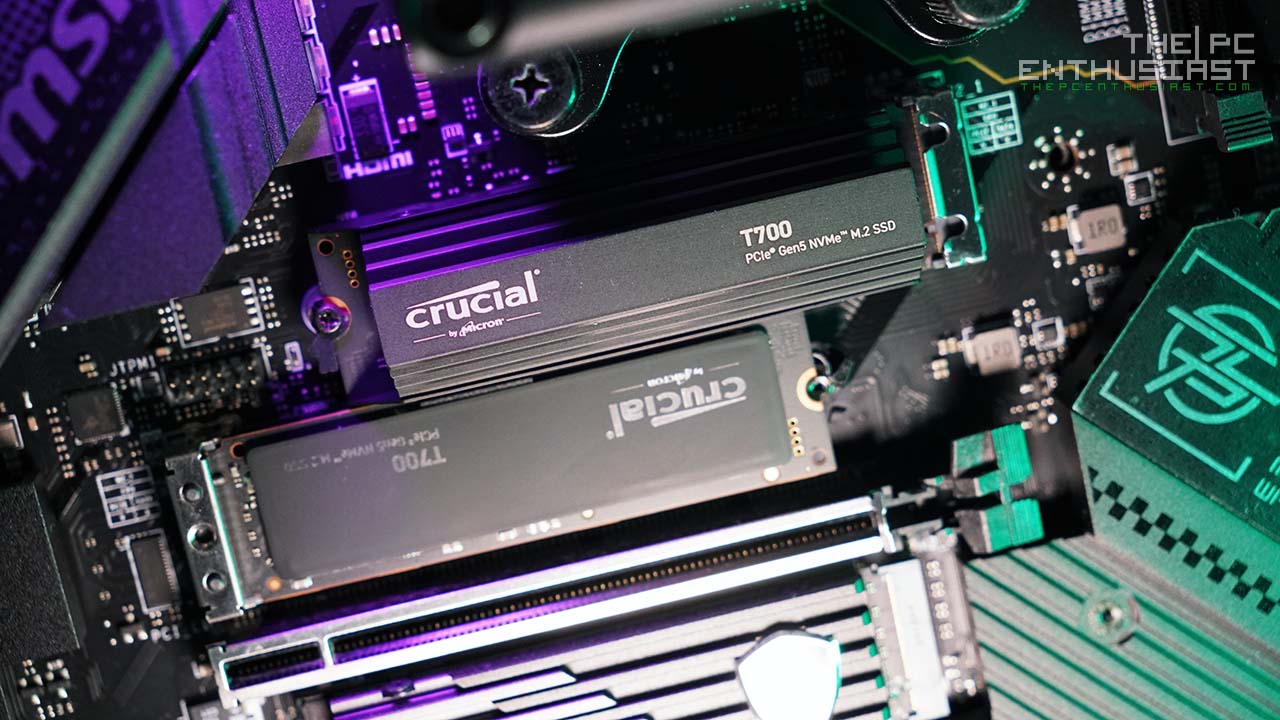

I just bought a 2TB 980 Pro. Yes the SN850 is a tiny bit faster but it was also a fair bit more expensive in my market. I had also read someone having issues with it when it was connected through the chipset. If money was no object I would have gone the Corsair MP600 Pro as it looked the best to me but had a price to match which wasn’t worth it for the small gain over the 980 Pro.
Yes, it really comes down to pricing. Specs sheet might show a somewhat substantial difference, but based on actual day to day use, it’s really hard to tell the difference.
I am also keen on checking out Corsair’s new SSDs. Still need to wait though.
Just not the liquid cooled one. I think that one is a bit overkill, unnecessary and very expensive. 😅
With non unlimited budget there isn’t any sense or even need to pay luxury prices.
In normal use differences between different SSDs aren’t that much.
In fact even SATA SSD isn’t easily detectable:
https://www.youtube.com/watch?v=4DKLA7w9eeA
So any proper NVMe is certainly good and already Phison E16 based 5GB/s drives with their now closer to PCIe v3 drives price would go long way to future normal user/gamer.
Especially if thinking between smaller capacity benchmarketing hype drive and more reasonably per GB priced bigger pdrive latter is always better:
Space you don’t have doesn’t have any speed… Except maybe to minus direction, because after running out of space you need to uninstall game/remove something to install new game.
you would have the same problem running the 980 pro through the chipset. depending on which chipset you are on the second nvme may be pcie gen3, so you wouldn’t get the full speed. AMD X570 uses pcie 4 for chipset but think thats the only one so far.